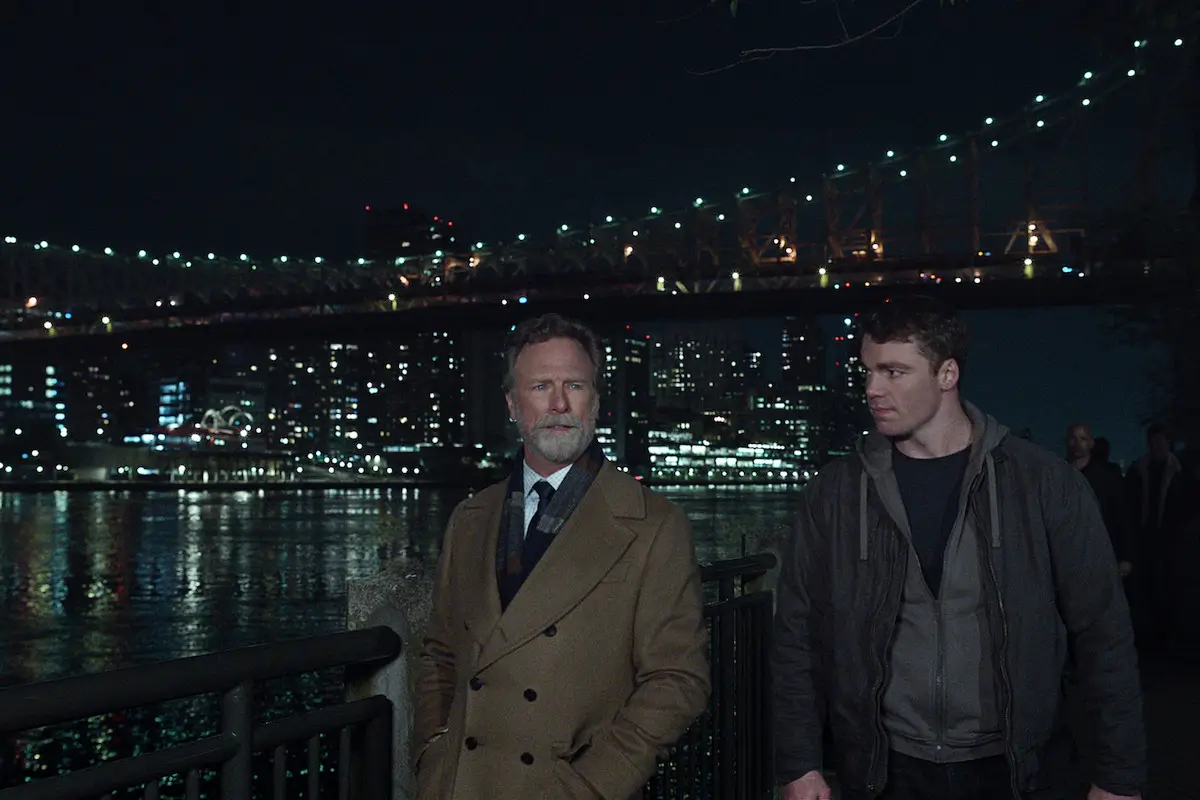In “The Night Agent” Season 2, Peter Sutherland begins to perceive the White House as a symbol of American leadership and as a fortress with potential threats lurking within its prestigious corridors. Initially focused on external dangers, Peter’s attention shifts as he senses a shift in the internal dynamics and motivations of those closest to the seat of power. This shift forces Peter to reconsider his understanding of who his allies and adversaries are.
His role as a Night Agent, meant to protect the nation, now compels him to scrutinize the actions and intentions of those within the White House, making him question the foundation of his duties and loyalties. This internal conflict adds a layer of psychological drama to the series, as Peter must navigate a web of deceit and intrigue in the very heart of the government.
Villainous Governor Hagan is poised to become the next U.S. President.

Governor Hagan’s ascent to power is a central theme in the season. Known for his ruthless political tactics and controversial policies, Hagan’s potential presidency signals a dramatic shift in the nation’s future. His character is crafted as a formidable antagonist whose ambition and cunning make him a credible threat to the country’s stability.
The storyline explores the mechanics of political manipulation and the ease with which a charismatic yet unscrupulous individual can ascend to immense power. Viewers are led to ponder the vulnerabilities of democratic systems and the dangers posed by those who seek power for their own gain. Hagan’s character development is a cautionary tale about the potential dark side of political ambition and its implications for governance.
Peter’s loyalty is tested as dangers threaten America from within.
As threats within the government become apparent, Peter finds his loyalty and ethical compass tested. The series delves into themes of duty versus morality, challenging Peter to redefine what it means to be loyal to his country. Is loyalty to his superiors or the broader ideals of justice and truth? This internal struggle is portrayed through intense personal dilemmas and decisions that have far-reaching consequences.
The storyline reflects the nature of loyalty in a world where political agendas and personal gain often blur the lines between right and wrong. It adds depth to Peter’s character, showing his growth from a straightforward agent to a complex character wrestling with profound ethical questions.
Catherine tasks Peter with infiltrating billionaire Jacob Monroe’s circle

Catherine Weaver, Peter’s boss and mentor, assigns him the daunting task of getting close to Jacob Monroe, a billionaire intelligence broker with nefarious plans. This mission is pivotal, pushing Peter into high-stakes espionage and corporate intrigue. With his vast resources and influence, Monroe represents sophisticated and chillingly plausible villainy. Peter’s infiltration efforts highlight his agent skills and expose him to significant personal risk.
The narrative explores themes of trust and betrayal, as Peter must build relationships based on deceit, knowing each interaction could be a trap. This storyline not only advances the plot but also deepens the psychological and ethical dimensions of the series.
Monroe, manipulating from the shadows, aims to control the upcoming presidency.
Working from the shadows, Jacob Monroe emerges as a master manipulator with the ambition to control the presidency through Governor Hagan. This plotline explores the frightening potential of behind-the-scenes power brokers in modern politics. Monroe’s manipulation is subtle yet pervasive, involving a complex network of influence that extends into various facets of political and economic life.
The series portrays a man who believes in the ends justifying the means, using his intelligence and resources to orchestrate political outcomes in his favor. His tactics raise questions about transparency and accountability in governance, making viewers think about the unseen forces shaping political landscapes.
Peter grapples with the consequences of past decisions, affecting allies deeply.
Throughout Season 2, Peter is haunted by the repercussions of his past decisions, which begin to affect his allies in profound ways. Each choice he has made—trusting a dubious informant or making a morally ambiguous decision—ripples through his personal and professional life, impacting those he works with and cares for.
This aspect of the narrative emphasizes the theme of consequences and responsibility, showcasing how actions in the espionage world can have personal and moral implications. It adds a layer of human drama to the series as relationships are tested and trusts are broken, highlighting the personal costs of a life dedicated to national security.
Peter’s final mission: uncover the true intentions behind Monroe’s sinister plans.
In a climactic turn of events, Peter’s final mission involves unraveling the true intentions behind Monroe’s intricate schemes. This mission is fraught with danger and moral ambiguity as Peter digs deeper into a conspiracy that could alter the nation’s course. The tension builds as Peter pieces together the puzzle, each clue drawing him closer to a potentially explosive truth. This storyline is crucial for setting up the dramatic finale, where personal and political stakes collide, forcing Peter to make decisions that will define his character and the series’ future.
Season 2 ends, leaving viewers pondering deep political and personal questions.
The finale of Season 2 leaves the audience with lingering questions about power, betrayal, and the ethical limits of espionage. As the plot twists unfold, viewers are compelled to think about the real-world implications of the themes presented in the series. The ending opens up discussions on the nature of power—how it is obtained, maintained, and lost—and the impact of personal relationships on professional duties. This reflective conclusion sets the stage for further exploration in the next season, promising more complexity and challenges for the characters.
What’s next for Peter? Season 3 promises more intrigue and danger.
Looking ahead to Season 3, the series teases even more challenges for Peter, suggesting a continuation of the intense, high-stakes scenarios that have defined the show. The promise of further intrigue and danger indicates that Peter’s journey will continue fraught with ethical dilemmas, personal conflicts, and professional trials. The anticipation of new adversaries, alliances, and plot twists keeps the viewers engaged, eager to see how Peter’s character will evolve and how the overarching narrative will develop in response to the unresolved issues from Season 2.

